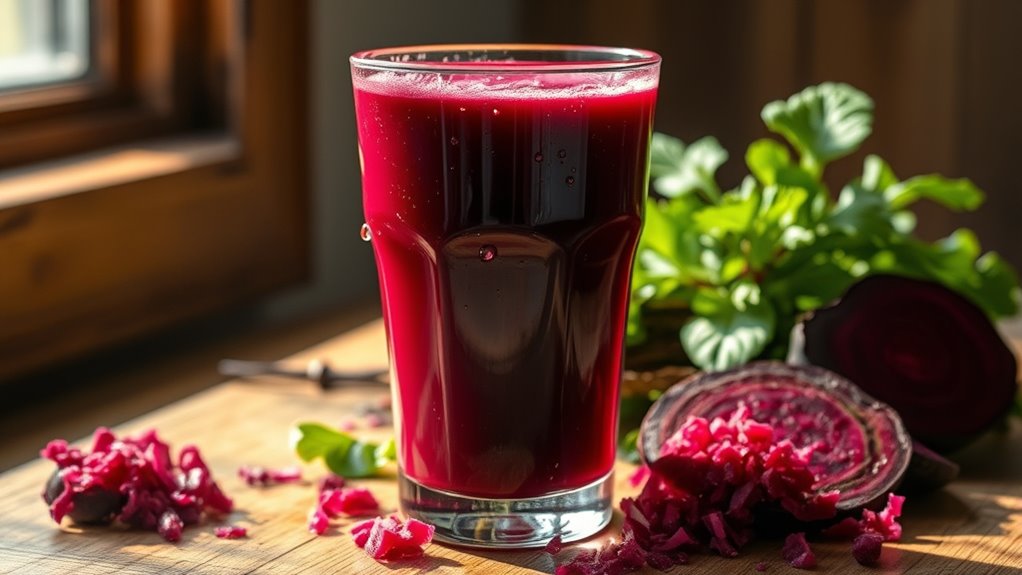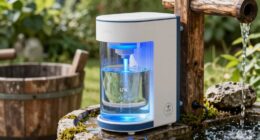You won’t believe the benefits of beet juice for your blood health! This vibrant juice is packed with dietary nitrates that convert to nitric oxide, helping to relax your blood vessels and lower blood pressure. Studies show daily intake can reduce systolic blood pressure by around 3.55 mm Hg. Plus, it boosts athletic performance, enhances cognitive function, and fights inflammation. Curious about how to maximize these benefits? There’s even more to discover!
Key Takeaways
- Beet juice lowers blood pressure by converting dietary nitrates into nitric oxide, promoting blood vessel relaxation.
- Regular consumption of beet juice can significantly enhance cardiovascular health and endothelial function.
- It improves athletic performance by increasing stamina and reducing recovery time through better blood flow to muscles.
- Beet juice boosts cognitive function by enhancing blood flow to the brain, leading to improved memory and reaction times.
- Its anti-inflammatory properties help alleviate pain and reduce the risk of chronic diseases, supporting overall health.
The Power of Nitrates in Beet Juice
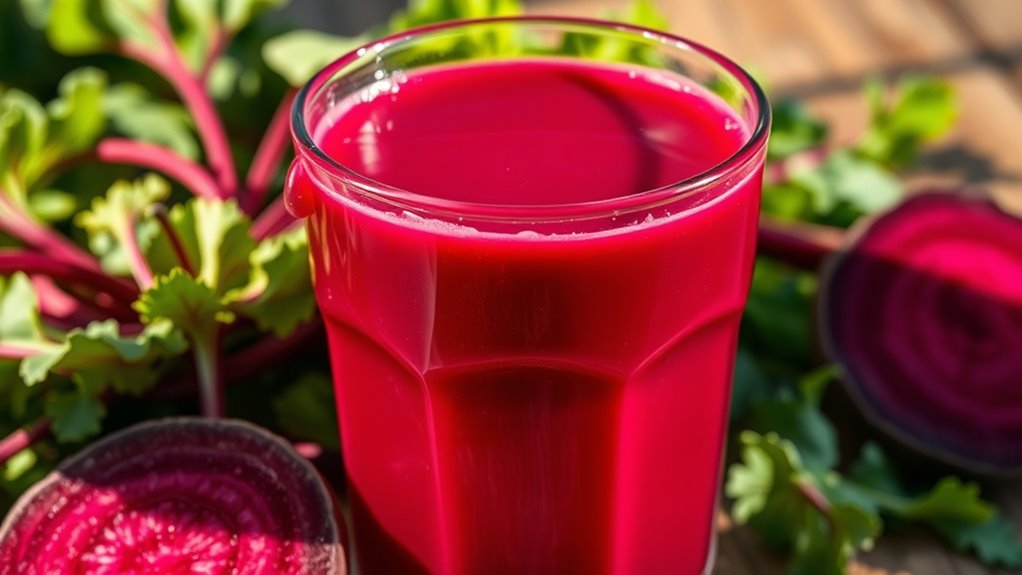
When you drink beet juice, you tap into the power of dietary nitrates that your body converts into nitric oxide. This transformation helps relax and widen your blood vessels, which can lead to lower blood pressure levels.
Studies show that daily consumption of beet juice can decrease systolic blood pressure by an average of 3.55 mm Hg and diastolic by 1.32 mm Hg. Not only does this juice contribute to better blood pressure management, but it also considerably enhances endothelial function and promotes cardiovascular health.
For best results, consider consuming at least 250 mL daily. With its quick effects—lowering blood pressure within about three hours—beet juice offers impressive health benefits for anyone looking to improve their vascular wellness.
How Beet Juice Lowers Blood Pressure
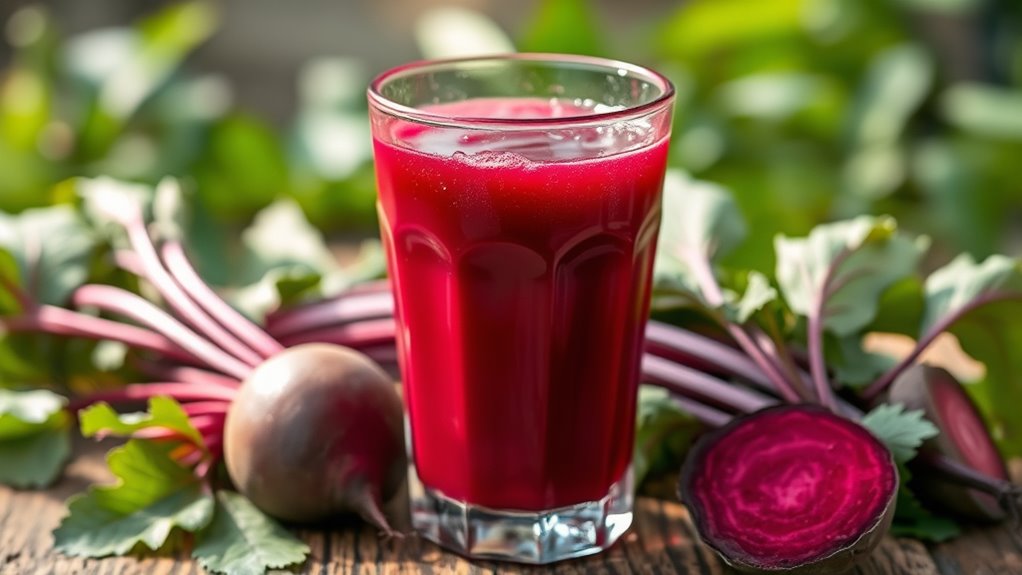
Beet juice acts as a powerful ally in lowering blood pressure, primarily due to its high nitrate content. When you consume beet juice, nitrates convert to nitric oxide in your body, helping to relax and widen blood vessels.
This process effectively lowers blood pressure, showing substantial results in just 30 minutes to three hours after ingestion. A 2022 meta-analysis revealed that regular consumption can reduce systolic blood pressure by an average of 3.55 mm Hg and diastolic blood pressure by 1.32 mm Hg for those with hypertension.
For ideal health benefits, drinking about 250 mL daily can provide long-term cardiovascular benefits and considerably decrease the risk of stroke and other complications linked to high blood pressure.
Boosting Athletic Performance With Beet Juice
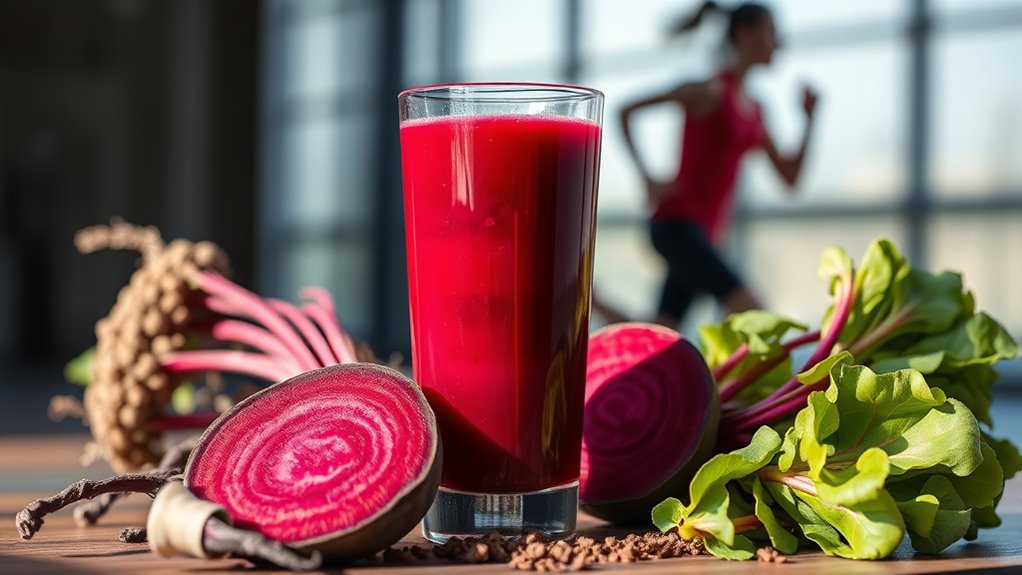
If you’re looking to enhance your athletic performance, beet juice might be your secret weapon.
It boosts your endurance levels and improves recovery time, letting you train harder and longer.
Plus, studies show it can greatly enhance your time trial performance, helping you reach new personal bests.
Enhanced Endurance Levels
While many athletes seek ways to enhance their performance, incorporating beet juice into your routine could provide a significant boost. This vibrant juice improves athletic performance by elevating nitrate levels in your blood, enhancing oxygen delivery to your muscles.
Here are three key benefits of beet juice for enhanced endurance:
- Increased Stamina: Long-term consumption improves exercise tolerance, allowing you to push harder without feeling fatigued.
- Better Blood Flow: Enhanced blood flow means improved oxygen usage, which translates to longer workout durations before exhaustion.
- Reduced Muscle Damage: The betalains in beet juice help minimize muscle damage, aiding in quicker recovery times post-exercise.
Improved Recovery Time
Releasing your potential in athletic performance involves not just pushing limits but also ensuring your body recovers effectively.
Beet juice is your ally in achieving improved recovery time. The nitrates in beet juice enhance oxygen delivery to your muscles, which helps reduce muscle damage and soreness after intense physical activity.
By incorporating beet juice into your routine, you’ll boost your exercise tolerance and minimize fatigue, allowing you to train harder and longer.
Studies reveal that regular consumption can extend your endurance and greatly reduce recovery time, enabling you to bounce back quicker.
Time Trial Performance
When you’re aiming to improve your time trial performance, beet juice can be a game-changer. This powerful supplement enhances athletic performance by boosting plasma nitrate levels, which improves oxygen delivery to your muscles during exercise.
Here’s how beet juice can help you:
- Increase Endurance: Long-term supplementation (5-6 days) allows you to sustain physical activity for longer periods.
- Enhance Exercise Tolerance: Consuming beet juice can reduce your rate of oxygen usage (VO2), helping you push harder without fatigue.
- Maximize Performance: Studies show a 10% improvement in time trial performance among trained cyclists with daily intake.
For best results, drink beet juice 2-3 hours before training or competition to truly elevate your performance.
Cognitive Benefits of Drinking Beet Juice
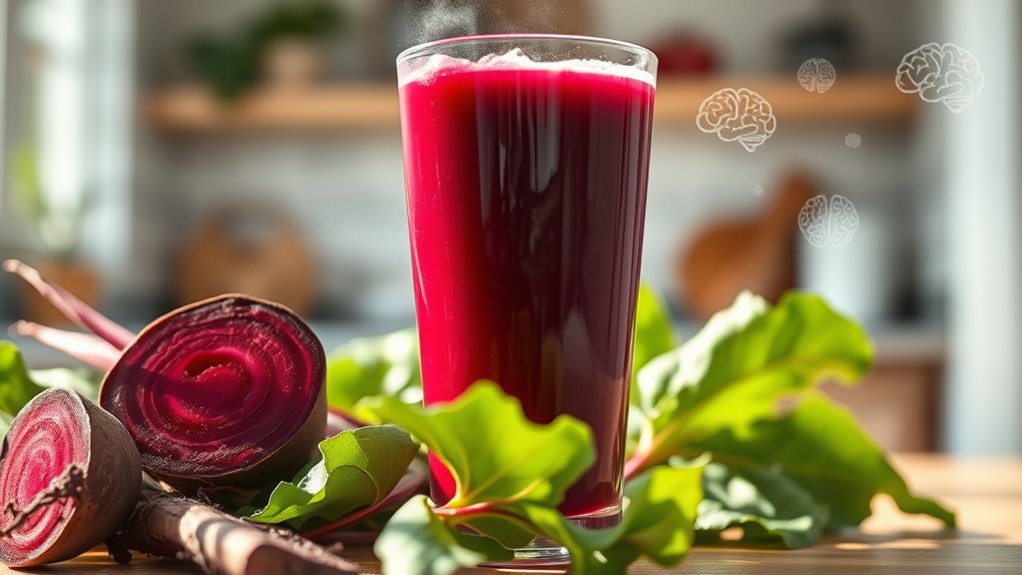
Drinking beet juice can greatly boost your memory and cognitive clarity.
The increased blood flow to the brain not only enhances your mental performance but also helps protect against neurodegenerative diseases.
Memory Enhancement
Beet juice may be your secret weapon for boosting memory and cognitive function, as it enhances blood flow to the brain. The nitrates in beet juice convert to nitric oxide, improving cerebral blood flow and neuron activity, which can lead to impressive memory enhancement.
Here are a few ways it benefits your cognitive abilities:
- Increased Blood Flow: Enhanced blood flow delivers more oxygen and nutrients to your brain, supporting overall brain health.
- Improved Reaction Times: Studies show that drinking beet juice can enhance your reaction times in cognitive tests, boosting mental agility.
- Antioxidant Properties: Beet juice’s antioxidants help protect your brain from oxidative stress, potentially lowering the risk of neurodegenerative diseases.
Incorporate beet juice into your routine for a sharper mind!
Neurodegenerative Disease Prevention
Enhancing your memory isn’t the only benefit of beet juice; it also plays a significant role in preventing neurodegenerative diseases.
The nitrates found in beet juice boost nitric oxide levels, which improves blood flow to the brain and supports cognitive function. This increased cerebral circulation not only enhances memory but may also reduce the risk of conditions like Alzheimer’s.
Antioxidants such as betalains protect your neurons from oxidative stress, a key factor in neurodegenerative diseases. Regularly sipping on beet juice can keep your brain health in check, making it a powerful protective dietary component.
Anti-Inflammatory Properties of Beet Juice
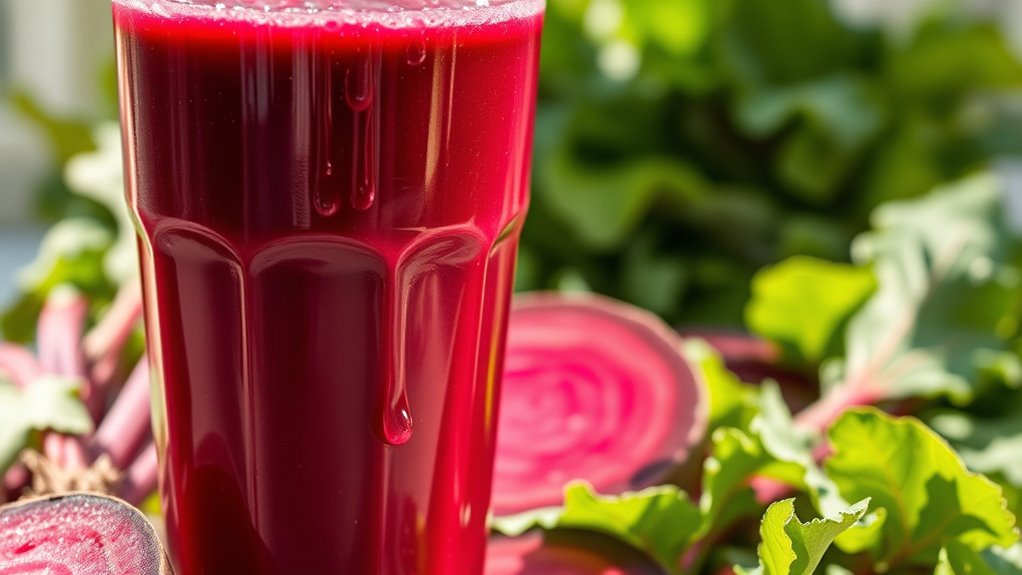
While many people seek natural ways to reduce inflammation, beet juice stands out due to its rich content of betalains, which are known for their powerful anti-inflammatory properties. Regular consumption of beet juice can help you combat inflammation and may lower your risk of chronic diseases.
Here are some key benefits:
- Pain relief: Studies show that beet juice can alleviate pain in osteoarthritis patients.
- Oxidative stress reduction: The antioxidant content increases after digestion, making it effective against oxidative stress.
- Heart health: Reducing inflammation can lower your risk of conditions like heart disease and obesity.
Incorporating beet juice into your diet can enhance your health benefits by managing inflammation and supporting overall well-being.
Recommended Daily Intake of Beet Juice
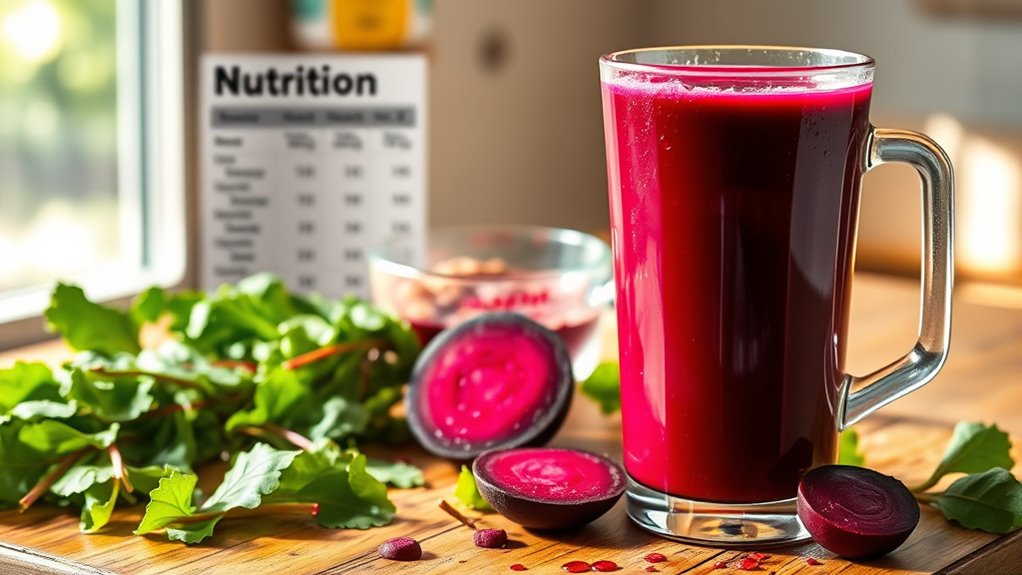
To reap the full benefits of beet juice, it’s important to know the recommended daily intake. Research suggests that consuming about 250 mL daily can greatly help reduce blood pressure and improve cardiovascular health.
If you’re looking to enhance athletic performance, consider drinking 70 mL of beet juice twice daily for three to six days leading up to an event.
For effective hypertension management, regular consumption over 60 days is encouraged. While the Dietary Guidelines for Americans recommend limiting juice intake to 240 mL daily, beet juice can still provide nutritional benefits within this limit.
Just keep in mind that individual responses may vary, so it’s wise to monitor your blood pressure as you incorporate beet juice into your diet.
Frequently Asked Questions
Is Beetroot Juice Good for Your Blood?
Yes, beetroot juice is good for your blood! It’s rich in nitrates, which convert to nitric oxide, helping relax and widen your blood vessels. This can greatly lower your blood pressure.
Drinking about 250 mL daily can lead to improvements in just a few hours. Plus, it enhances oxygen delivery to your muscles, improving endurance and reducing fatigue during exercise.
Regular consumption may also help lower LDL cholesterol and promote healthy blood flow.
What Happens to Your Body if You Drink Beet Juice Every Day?
When you indulge in daily beet juice, you might just be treating your body to a delightful boost.
Over time, you could notice a decrease in blood pressure, thanks to its high nitrate content promoting relaxation of blood vessels.
This ruby elixir also packs a punch of essential nutrients, supporting heart health and overall vigor.
With its antioxidant properties, you’re not only nourishing your body but also enhancing your wellbeing in a revitalizing way.
How Much Beet Juice Should I Drink a Day to Help With Blood Circulation?
To help with blood circulation, you should aim for about 250 mL (approximately 8.5 ounces) of beet juice each day.
This amount can lower your systolic blood pressure by around 3.55 mm Hg and diastolic by 1.32 mm Hg, enhancing your cardiovascular health.
For the best results, make sure you consume it regularly for at least 60 days and monitor your blood pressure to see how your body responds.
How Long After Drinking Beet Juice Will Blood Pressure Lower?
After you drink beet juice, you can expect your blood pressure to start lowering within 30 minutes to 3 hours.
This effect occurs as dietary nitrates convert into nitric oxide, which helps relax your blood vessels.
For the best results, consider consuming about 250 mL daily and maintain this routine for at least 60 days.
Just remember, individual responses can vary, so keep an eye on your blood pressure during this time.
Conclusion
So, who would’ve thought that sipping on beet juice could pack such a powerful punch for your blood? While you might’ve been eyeing that sugary soda, it’s actually this vibrant veggie drink that could lower your blood pressure and boost your brainpower. Talk about a twist! Next time you reach for a refreshment, remember that nature’s own ruby elixir is just waiting to transform you into a healthier version of yourself. Cheers to beets—who knew they were so cool?
Cindy thoroughly researches juicing trends, techniques, and recipes to provide readers with practical advice and inspiration. Her writing style is accessible, engaging, and designed to make complex concepts easy to understand. Cindy’s dedication to promoting the advantages of juicing shines through her work, empowering readers to make positive changes in their lives through the simple act of juicing.

